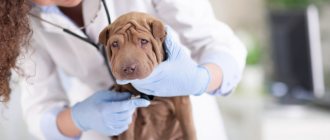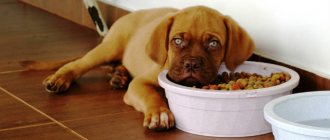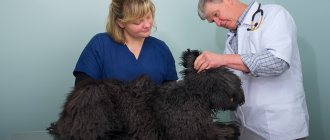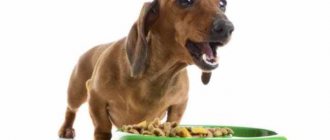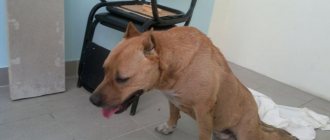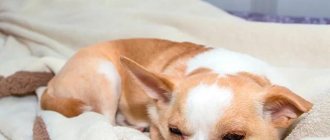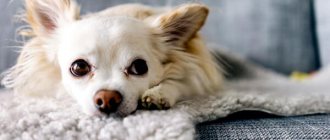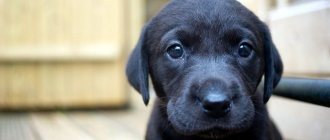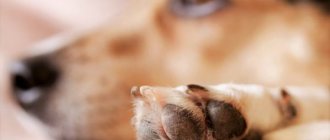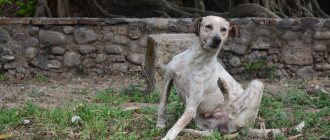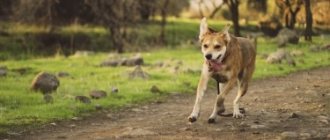Dogs practically do not have bad habits. But some owners note that animals chew their paws from time to time. Some people think that this is a normal phenomenon. The process of biting paws is attributed to self-care and maintaining body cleanliness. But if the nature of the biting differs from normal licking, and bloody gnawing is observed, it is necessary to solve the problem.
Why does a dog chew its paws?
Acute moist dermatitis
Acute moist dermatitis is localized areas of inflammation caused by repeated licking of the area. This is a reaction to severe itching, often occurring overnight. Hair loss often occurs with moist, red, itchy skin.
A topical anti-inflammatory and antimicrobial spray made for dogs can help treat a dog's paw hot spot until the cause is determined. Topical hydrocortisone sprays may also help.
Consequences of biting
Why does a dog lick its owner's feet and what does it mean?
When a dog chews his paws, he has little control over his actions. Severe itching forces him to bite himself until he bleeds. When examining the limbs, wounds on the pads are noticeable. They can become infected, causing severe inflammation and ulcers. Frequent bites can cause bone damage.
Important! If treatment for pododermatitis and infectious diseases is not started in time, swollen paws will make it difficult for the animal to move. After some time, the mobility of the limbs may disappear.
Without paying attention to the dog’s strange behavior, you can miss the onset of the development of neurosis. The pet will become more anxious every day. Due to constant stress, his health will deteriorate.
Allergy
If your dog's paws are itchy, it could be due to an allergy. Allergies are common and can be caused by the environment, food, or an irritant that comes into contact with your dog's skin.
Redness, dark pigmentation, or brown spots on the paws from constant licking may be signs of an allergy. Washing or drying your dog's paws after going outside will reduce the number of allergens on your dog's skin.
Topical hydrocortisone creams or sprays sold for dogs can temporarily relieve the itching, but more intense licking requires systemic treatment (prescription medications that affect the entire body).
Causes
There are a number of objective reasons for pathological behavior. Each of these can encourage the animal to chew on its limbs.
Lack of hygiene
The dog cleans its paws after a walk if they are not washed well. This is how the animal carries out hygiene procedures on its own.
Long claws disturb the animal and dig into soft tissues. The animal relieves discomfort by licking the pads and wounded skin.
Hair matted between the toes provokes the development of diaper rash and fungal diseases. The animal chews out the pellets, cleansing the skin.
Ringworm
Ringworm is a fungal infection that spreads easily through contact with contaminated soil or animals. It is usually found on the paws, as well as the head, ears and limbs of dogs.
Hair loss and redness of the skin may occur, but some animals may have ringworm and not show any signs.
Topical creams, shampoos, and sauces can be helpful in getting rid of ringworm.
Long-haired animals may need to have their hair shaved to prevent re-infestation. This should only be done with pet clippers and you should use a guide comb to avoid pressing too close to the skin.
Prevention
It is not difficult to protect your pet from unpleasant diseases. You need to follow the rules of hygiene and inspect the dog’s limbs after a walk.
Hygiene
Expert opinion
Makarenko Svetlana Igorevna
Practicing veterinarian, 15 years of experience.
Long-haired breeds suffer from diaper rash and fungal infections more often than others. Thick fur falls between the toes, gets wet after walking or swimming, dirt accumulates there, creating a favorable environment for the development of bacteria.
The pet's paws are regularly examined, and hairballs are removed approximately once every 2 weeks, cutting it down to the skin.
Nails are trimmed 2 times a month. They should not interfere with the pet's movement. The ingrown stratum corneum rubs the skin, the nail bed becomes inflamed, and the dog feels pain and discomfort and tries to gnaw out the foreign object.
Regular inspection
The pet's paws are examined daily. In summer, there is a danger of ticks, splinters, glass getting under the skin, and getting burned on hot asphalt.
In winter, dogs suffer from ice fragments, reagents, spilled gasoline or motor oil. Wounds identified in a timely manner are treated and bandaged.
It is important to remember that insect bites in dogs cause piroplasmosis. Without timely treatment, this disease is fatal.
Timely vaccination
The procedure helps to avoid common infectious diseases in dogs.
Even if a virus or bacteria gets into the blood, the animal easily transfers the disease, there are no complications.
Enriched diet
The predominance of protein foods (meat) in a dog’s diet leads to the development of dermatitis. The skin becomes dry and itchy. The animal cannot get rid of the itching; it bites its tail and paws.
It is believed that an animal only needs meat, but this statement is fundamentally wrong. Dogs need vitamins and microelements. You can find them in cereals and vegetables.
After the tests, the veterinarian prescribes special synthetic vitamin supplements, which are added to the pet’s natural food.
If the owner cannot prepare a variety of natural foods, the dog is switched to ready-made food. Manufacturers made sure to include all the substances necessary for a pet.
You can choose food according to age, physical activity, and breed.
Drink
Every day your dog needs clean drinking water. The liquid enhances metabolism, improves kidney function, and helps remove toxins from the body faster. If an animal has access to clean, high-quality water, the likelihood of developing allergies and dermatitis is reduced significantly.
Toenail injuries
If your dog continues to lick one paw, he may have a damaged toenail or a partially torn nail. This can happen if it gets caught on grass, fabric or carpet. Bleeding from the dog's nail is common, as well as the dog's paws becoming swollen and uncomfortable.
The claw will improve if you carefully remove the severed part. Medicines for infections and inflammation may also help. Contact your veterinarian for assistance in removing the severed portion of the nail and for medication.
Diagnostics
At an appointment with a veterinarian, an external examination takes place. The veterinarian examines the general condition of the animal, the dog’s oral cavity, and carefully examines the wounds. If matted fur or abnormal nail growth occurs, the animal is sent to a groomer to correct the problems.
If there are no visible injuries, but the animal continues to bite its paws, an in-depth examination is carried out. The doctor takes:
- scrapings to determine allergic reactions or parasites;
- blood chemistry;
- cal.
The question of treatment will arise after receiving the results.
Means for melting snow and ice
Winter snow and salt used to remove ice can also cause skin irritation, causing your dog to lick his paws. Extreme cold and irritation from salt can cause the affected areas to become red. Contact your veterinarian if you suspect your pet's paws are irritated by snow or deicer.
Using boots when walking in winter will help avoid this. You can also use paw wax or dog-safe de-icers for your own yard.
Seeking help from a veterinarian
Why does a puppy eat dirt and stones and what should the owner do?
If your dog rarely licks its paws, you should not contact a veterinarian. This is normal behavior for a pet to maintain its hygiene. If your four-legged pet begins to lick and bite its limbs more often, or its health has worsened, then you should start to worry.
First you need to examine your pet's paws. If they are inflamed and there are bruises, then the dog is sick. She urgently needs veterinary help.
Don't delay getting your animal examined by a veterinarian if its paws are bleeding.
The doctor will examine the dog and take scrapings from the diseased areas. This will help identify the cause of the ailment and prescribe the necessary medications. It is impossible to make a correct diagnosis on your own. If treatment is not started on time, complications are possible.
Ticks
Ticks are parasites that live in bushes and forests and can burrow between your dog's toes and paw pads. This can cause discomfort and cause your dog to lick the affected paws.
Carefully remove the entire tick using a tick remover so that the embedded parts of the mouth are carefully released.
Keep your dog protected from fleas and ticks to prevent this from happening.
When you shouldn't worry
If an animal bites its limbs during hygiene procedures, licking itself after a walk, there is no need to worry: the pet needs to get rid of thorns, seeds, and dry grass stuck in its fur.
If these actions are not regular, the pet is calm, the paw pads are clean, smooth, there are no cuts, wounds, or ulcers on them, there is no need to worry about him.
Little puppies chew their paws when they are bored. As you get older, this can become a habit that can be difficult to break.
Demodex mites and scabies
Mites can live on an animal's skin, causing hair loss, crusting, inflammation and itching that causes licking.
There are two types of mites: the demodex mite, which lives deep in the hair follicle, and the scabies mite, which lives on the surface of the skin. Both can cause hair loss, redness, and bacterial infection of the skin.
Demodex mites located on the feet may indicate the presence of an underlying disease, such as Cushing's disease or cancer, that suppresses the immune system.
Ticks can be treated with topical or oral medications. Oral medications used to treat demodex mites (NexGard, Bravecto) and scabies (ivermectin) are available by prescription only.
Lime-sulfur sauces for scabies mites can be purchased over the counter, but they have an unpleasant sulfur odor and may stain animals or light-haired surfaces. Their use should also be supervised by a veterinarian.
Psyche
Unfortunately, many dog owners leave their dogs at home for long periods of time. At the same time, the animal experiences stress, suffers from loneliness and boredom.
They find salvation in their own paws, because a monotonous task is distracting, and thus waiting for the owner to arrive becomes less tiring for them.
Why go far, let's remember tips for getting rid of stress for people: reading, knitting, cross-stitching, drawing, etc. These are all monotonous activities that force you to concentrate and thereby relieve stress.
Only dogs can’t do anything like that, so they came up with this type of activity. It is also a unique way to attract attention. After all, when you see your pet chewing its paw, you will immediately begin to say something displeased to him, but he is only glad to have at least some communication from you.
Therefore, do not neglect your dog, but spend more time with it.
Anxiety and boredom
Anxiety and boredom usually cause a dog to continue licking its paws. Repeated movements calm dogs. Hair loss with thickened, raised skin or mucous granuloma may occur in this area.
A prescription medication that can treat licking granulomas is Synotic with extra banamine.
This combination anti-inflammatory lotion is used to treat damage caused by repeated licking of the same area, often the wrist.
A prescription topical medication may help, but you also need to figure out what's causing your concern. Contact your veterinarian to help you understand the cause and come up with a plan to help your dog.
Behavioral problems
If you and your vet have ruled out all of the above problems, then your dog may be licking his paws out of boredom or a psychological problem such as anxiety. Again, this is difficult to diagnose, but there are several steps you can take to help your pet. The fact is that some dogs develop compulsive behavior, including licking their paws.
Behavioral problems can also trigger paw licking.
To resolve this issue, try taking your pet for walks, runs, or play with him more often to expend more mental and physical energy. Give him special toys for active games that will be able to distract the dog from his paws.
In addition, fear of sharp sounds or sadness from separation from the owner can provoke licking of puppies' paws. A good dog handler should definitely take this option into account.
Cysts and bumps
Cysts can form on your dog's feet, causing your dog to lick his paws. These are fluid-filled swellings that can become trapped by foreign objects, especially between the toes.
Some cysts are growths that may contain thick material and may gradually enlarge over time. In a cyst that is draining, the embedded material may need to be removed.
Contact your veterinarian for treatment of the cyst. They may prescribe oral antibiotics to treat any infections.
Diaper rash
Such a nuisance as diaper rash occurs mainly in long-haired breeds due to the fact that a fairly large amount of hair grows on the paws and between the toes.
Long-haired dogs include Dachshund, Spaniel, Chihuahua, Beagle, Weimaraner, Russian Toy Terrier, Hungarian Vizsla, Shih Tzu, Caucasian Shepherd, Pekingese, and German Shepherd.
Poorly dried hair after bathing and lack of ventilation are a good breeding ground for bad microflora.
Avoiding this problem will not be difficult. It is enough to ensure that very long hair does not grow on the paws, and cut it off in a timely manner, and after bathing, dry the area between the toes well with a hairdryer.
Did you know? Dogs can also sweat, just like people. Only their sweat glands are concentrated not in the armpits, but on the pads of the fingers.
These simple measures will keep your skin dry and eliminate diaper rash.
What should you do if your dog constantly licks its paws or uhsp`n paws?
Common reasons why a dog constantly licks and chews its paws include environmental allergies and food allergies.
Environmental allergies often begin between 2 and 4 years of age. They will come and go due to seasonal exposure to allergens and may be accompanied by itching of the face and back.
Food allergies often develop before the age of one. They develop in response to the type of protein the dog eats and remain the same throughout the year. Food allergies can be accompanied by itching on the face and ears.
How to Protect Your Dog's Paws
Here are some ways to protect your dog's paws.
Check your dog's paws daily
The daily habit of carefully checking your dog's paws will help you identify problems early so they can be easily corrected.
Be sure to inspect the top and bottom of the paws, as well as the toes, nails, pads and between each paw. Note any signs of injury, irritation, foreign objects, or any obvious abnormalities.
Use a moisturizing cream for your paws
Protecting your dog's paws may include regularly moisturizing them with a pet moisturizer or lotion.
Be sure to avoid human lotions and medications as they are not safe for dogs.
How to stop your dog from licking sores
Many people wonder what to do if a dog licks its paw until it’s red. Any damage must be treated first. To do this, lubricate the paw with a healing agent while holding the dog by the thigh. A sterile bandage should be applied to the wound. If the dog tries to get rid of it, a veterinary collar will help.
If an animal constantly strives to lick its paws or scratch behind its ear, then it is better to immediately show it to a veterinarian. It is not always possible to determine the cause of this behavior on your own, not to mention the appropriate treatment methods. Some diseases are so serious that the animal can lose a limb without treatment. And many infections can spread to the host.
